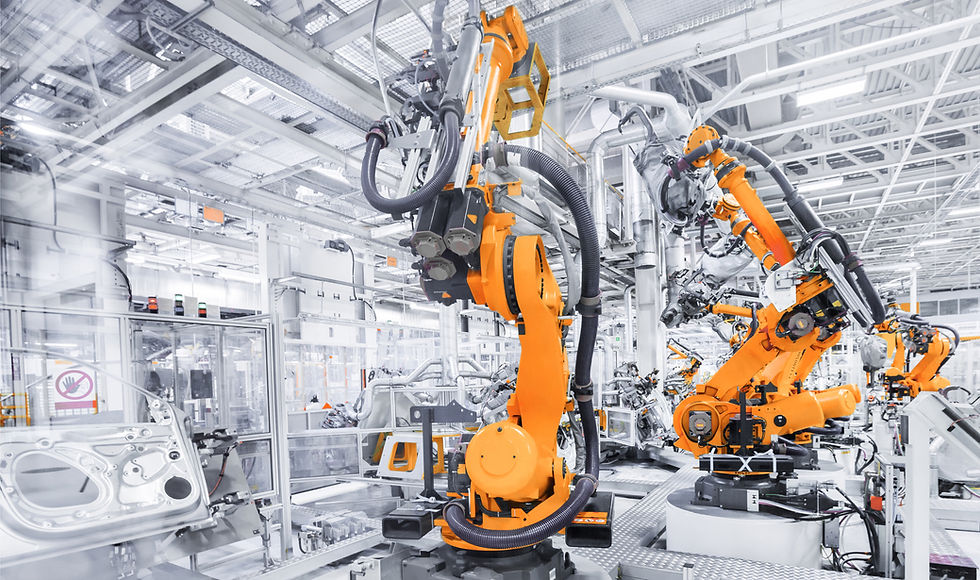Manufacturing with built-in AI in IFS Cloud
- Lisa Diehl
- Feb 5
- 3 min read

Manufacturers need to enhance efficiency, reduce expenses, and stay competitive in a fast-changing industry. To achieve this, manufacturers are increasingly using Artificial Intelligence (AI) technology to optimize their processes and boost productivity.
As manufacturing becomes more digital, automation and real-time data play a key role in helping companies stay agile and responsive. IFS offers a solution for manufacturing with built-in AI in IFS Cloud.
IFS Cloud for Manufacturing uses AI to enhance key manufacturing functions like Manufacturing Execution Systems, which manage the production process in real-time, and Manufacturing Scheduling & Optimization, which helps companies plan and use their resources more effectively.
By combining AI with Manufacturing Execution Systems (MES) and Manufacturing Scheduling & Optimization (MSO) functions, IFS Cloud helps manufacturers work more efficiently, reduce costs, and remain competitive.
Manufacturing companies are under constant pressure to improve efficiency, reduce costs, and remain competitive in a rapidly changing industry. With increasing market demands and supply chain complexities, adopting new technologies like Artificial Intelligence (AI) is crucial to optimize operations and enhance productivity.
AI-driven solutions, such as IFS Cloud for Manufacturing, are transforming how manufacturers manage production, streamline processes, and respond to disruptions. Embracing these technologies enables organizations to improve operational efficiency, reduce downtime, and remain agile, ensuring long-term success in an evolving digital landscape.
Manufacturing Execution Systems (MES)
MES plays a critical role in modern manufacturing plants. It acts as the backbone for managing production processes in real-time, tracking inventory, work orders, and equipment status.
IFS Cloud’s integrated MES capabilities enhance shop floor automation in several ways:
Cost Reduction: By automating shopfloor reporting and quality inspections, IFS Cloud reduces the need for manual data entry, minimizing errors and streamlining data collection and processing, ultimately lowering production costs.
Enhanced Equipment Efficiency: Real-time monitoring of equipment performance helps manufacturers detect potential issues early. By analyzing data, they can shift from scheduled maintenance to predictive maintenance. This approach minimizes unexpected downtime and extends the lifespan of equipment.
Improved Throughput and Quality: With real-time feedback, IFS Cloud enables manufacturers to adjust machine settings and production plans, ensuring continuous improvement in both throughput and product quality.
Manufacturing Scheduling & Optimization (MSO)
Manufacturing scheduling and optimization are crucial for maximizing the efficient use of resources, including machines, labor, and materials. AI plays a key role in enhancing these processes by leveraging data from MES and other ERP systems.
Here’s how IFS Cloud optimizes scheduling and resource allocation:
Optimized Operations: The AI-powered Smart Manufacturing Planning Board optimizes production planning and capacity utilization, reducing lead times, work-in-progress (WIP) inventory, and improving overall customer service levels.
Resource Allocation: AI algorithms intelligently consider factors like workforce skills, availability, and machine capabilities to allocate tasks. This ensures that the right people and equipment are in the right place at the right time, minimizing idle time and reducing labor costs.
Production Line Optimization: By continuously monitoring equipment performance, IFS Cloud can predict maintenance needs before failures occur. This predictive maintenance capability reduces downtime, enhances equipment lifespan, and optimizes production line efficiency.
By harnessing AI within IFS Cloud for Manufacturing, organizations can realize a range of benefits that drive operational excellence and competitiveness:
Improved Operational Efficiency: Streamlining processes, reducing downtime, and optimizing resource allocation leads to significant efficiency gains.
Enhanced Product Quality: AI-powered predictive quality control helps minimize defects and ensures consistent product quality across production runs.
Greater Agility: Manufacturers can quickly adapt to changing market demands and unforeseen disruptions, making their operations more flexible and resilient.
Cost Savings: Lower energy consumption, efficient scheduling, and predictive maintenance all contribute to reducing operational costs.
ata-Driven Decision-Making: AI-generated insights empower manufacturers to make more informed, data-driven decisions, improving overall strategic planning.
Built-in AI in the IFS cloud will help in achieving greater production throughput, increased production capacity utilization, and an enhanced bottom line.
IFS Cloud delivers improved scalability and flexibility for the manufacturing industry. This cloud-based platform enables rapid deployment of applications, allowing companies to swiftly scale their operations up or down based on demand.
With a range of customizable features, organizations can tailor applications to meet their specific needs, ensuring they remain agile and responsive to changing market conditions. This enhanced scalability and flexibility help companies maximize efficiency and minimize waste.
If your business is ready to explore IFS Cloud for your service operation, Enterprise Software Solutions, Inc., is here to help. We’re your one-stop shop for IFS Cloud licensing, implementation, customization, and support solutions. For a demonstration of the possibilities, contact us at 913-308-8936.

